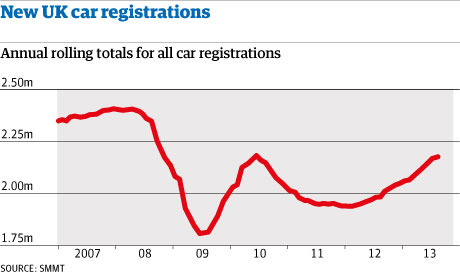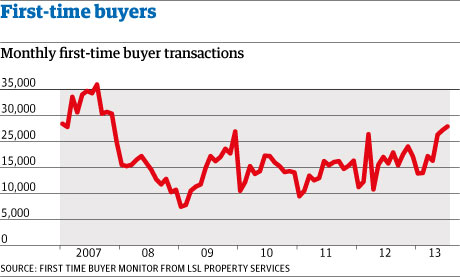Sharp rise in numbers getting on property ladder while vehicle registrations show 18th straight monthly rise


Strong car sales and new data showing that the number of first-time buyers in Britain's housing market jumped by 45% in the year to July have reinforced the picture of an economy in the grip of a summer mini-boom.
An analysis by LSL Property Services, which owns estate agencies including Your Move, suggests there were more than 26,000 first-time buyer transactions in July – a dramatic increase of 45% on the same month in 2012.
David Newnes, director of LSL Property Services, said: "Mortgages are much more affordable for first-time buyers compared to last year, which has opened the door to thousands of would-be buyers who were shut out of the market. Economic confidence is returning, nudging many more buyers in the direction of property, and nudging lenders to offer more loans to buyers with smaller deposits."
Car sales have also been strong, echoing robust growth in high street sales. The number of new cars registered last month rose 10.9% to 65,937 compared with a year earlier, according to the Society of Motor Manufacturers and Traders (SMMT).

That marked the 18th successive monthly rise in new car sales and pushed year-to-date sales to 1.39m vehicles, 10.4% higher than a year ago. By the same point in 2007, before the financial crisis, 1.52m new cars had been sold.
Private purchases were the biggest drivers of growth, but fleet and business purchases also rose in August.
"UK new car registrations have now risen consecutively for a year and a half. Private and fleet buyers are clearly capitalising on attractive deals and new technologies against a backdrop of increasing economic confidence," said Mike Hawes, chief executive of the SMMT.
However, the strong data intensified the sell-off in the bond markets on Thursday, increasing the pressure on Bank of England governor Mark Carney's policy of "forward guidance". Carney, who was hand-picked by the chancellor, George Osborne, hoped to keep borrowing costs low across the economy by sending a clear signal that he would not raise interest rates until unemployment falls below 7%, which the Bank's nine-member monetary policy committee expects to take at least three years.

But a batch of data suggesting the economy has started to recover have prompted investors to bet against the Bank, in the belief that Carney will be forced to raise rates before 2016.
When the MPC opted not to deliver a fresh warning to the markets after its monthly rate-setting meeting on Thursday, the yield – effectively the interest rate – on 10-year government bonds, or gilts, surged through 3% for the first time since July 2011. Yields are now higher than in July this year, when the MPC released a statement within days of Carney's arrival saying that recent moves in financial markets had been "unwarranted".
There are growing concerns that the continuing sell-off in bond markets is driving up long-term interest rates, which could threaten the recovery, since many loans – particularly to businesses – are priced according to bond yields rather than the Bank's base rate.
"Ever higher market interest rates challenge the Bank's assessment of the outlook. Either the MPC needs to confront these market moves by stating that rate expectations are unwarranted – and thus guide rates lower – or it needs to acknowledge that the improving fundamentals have changed the position vis-à-vis the July and August meetings," said Ross Walker, UK economist at Royal Bank of Scotland.
Howard Archer of consultancy IHS Global Insight said: "The MPC is increasingly facing a real dilemma, resulting from the surprisingly strong growth that the economy is currently experiencing. While this robust growth is a hugely welcome development following the economy's prolonged struggles, it is making the markets even more sceptical that the Bank of England will not raise interest rates from 0.50% before mid-2016."
Carney will appear before MPs on the Treasury select committee to explain the policy of forward guidance next Thursday.
Mario Draghi, the president of the European Central Bank, also left interest rates on hold yesterday, after the 18-member eurozone clambered out of recession in the second quarter of the year; but he admitted that the bank's governing council had considered a rate cut.
At his press conference after the ECB's meeting, Draghi said: "I am very, very cautious about the recovery, I can't share the enthusiasm. These shoots are still very, very green."
Article Source : http://www.guardian.co.uk
Azure Global’s vision is to be widely recognized as a reputed firm of financial business advisors, achieving real growth for ambitious companies and to become the first choice for F&A outsourcing for accountancy practices and businesses alike and if u want to Setup ur business in United Kingdom then its not difficult in this modern age for more info visit our site Azure Global and join us also On Facebook
.jpg)
No comments:
Post a Comment